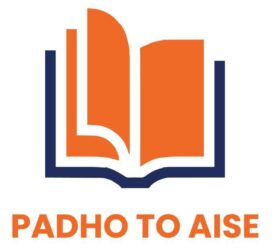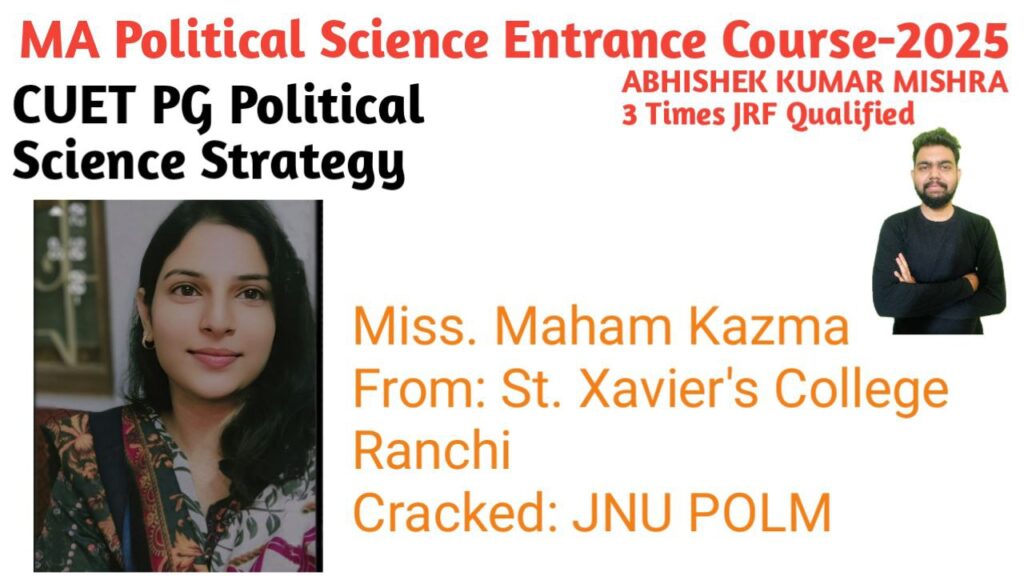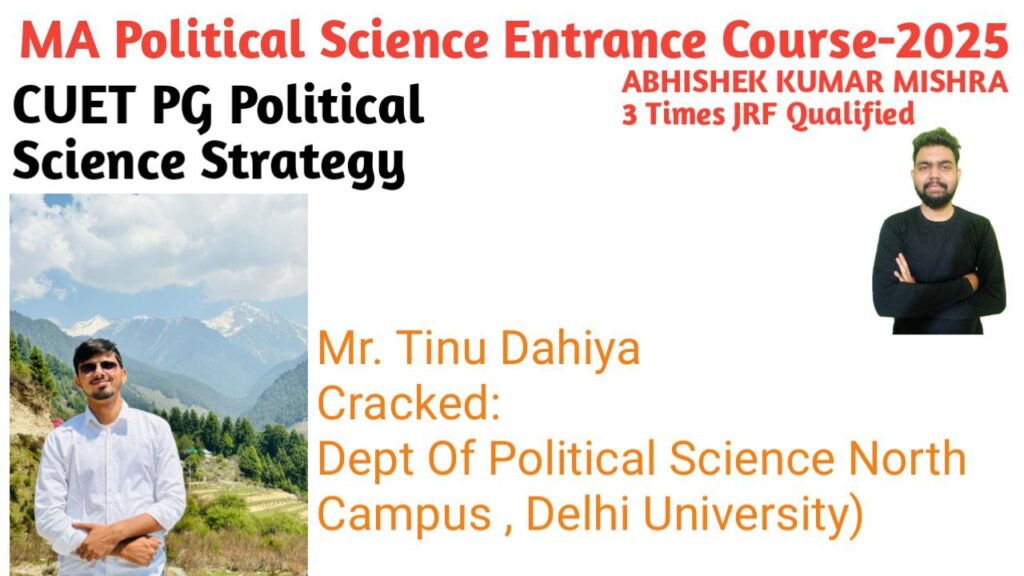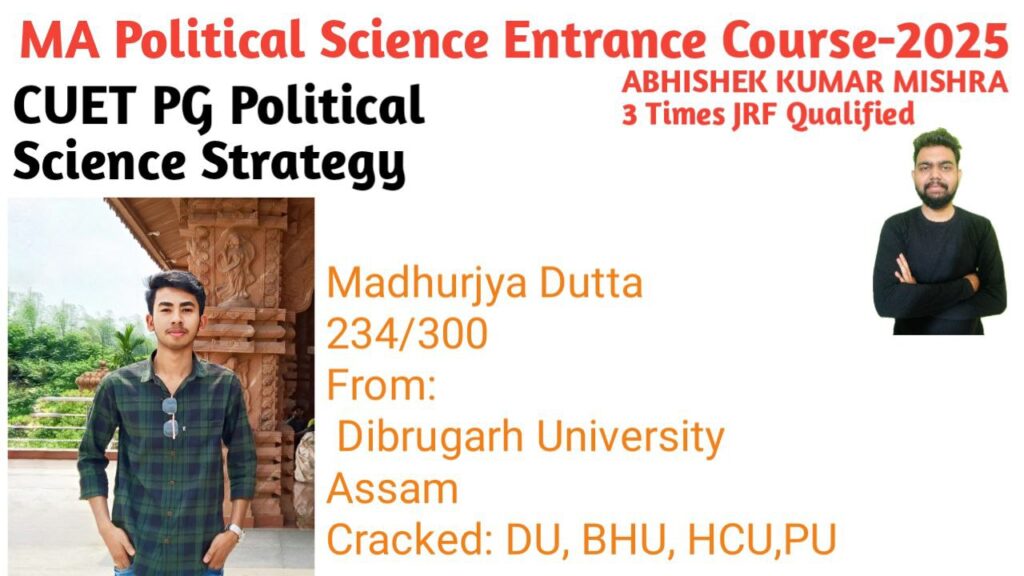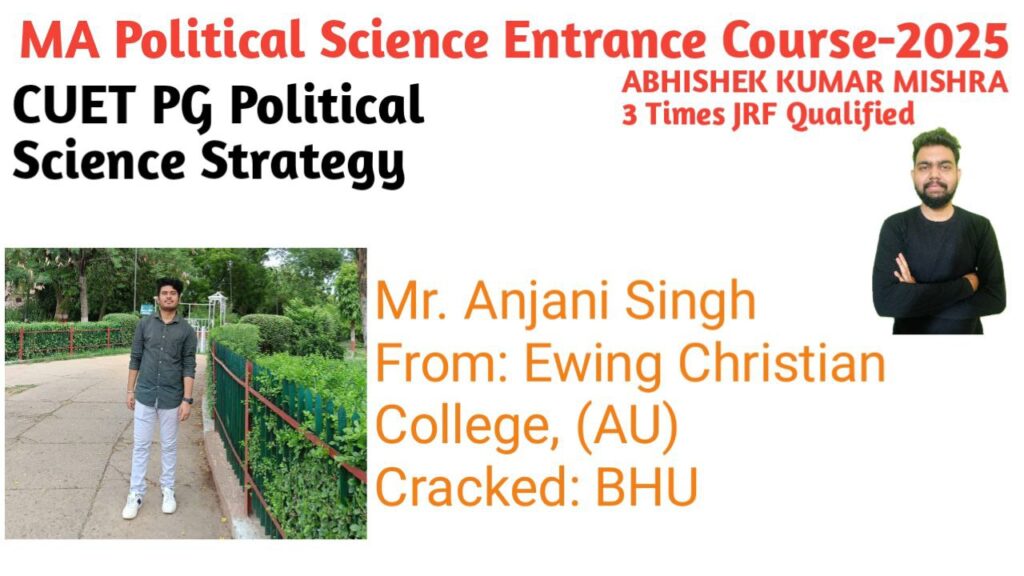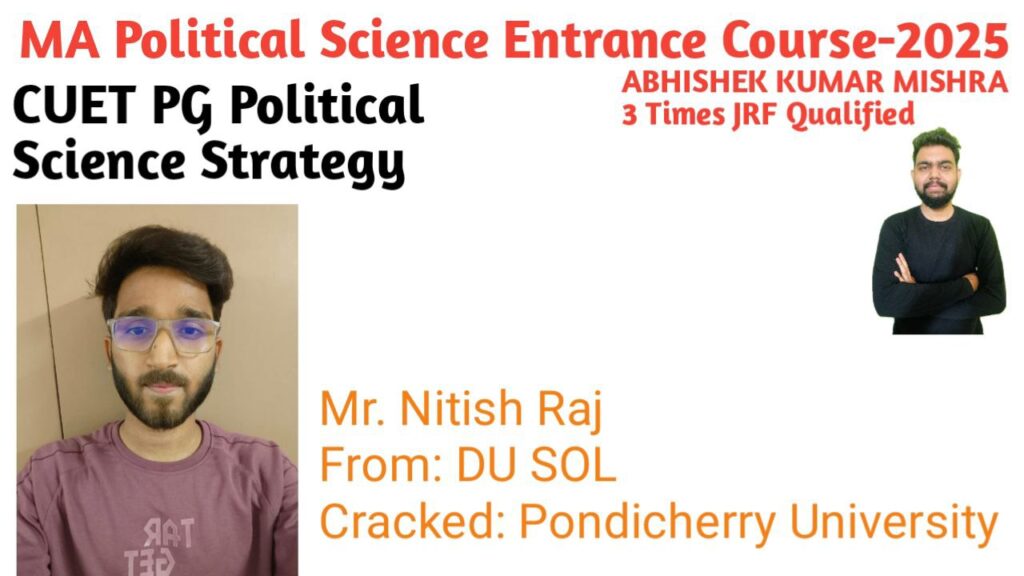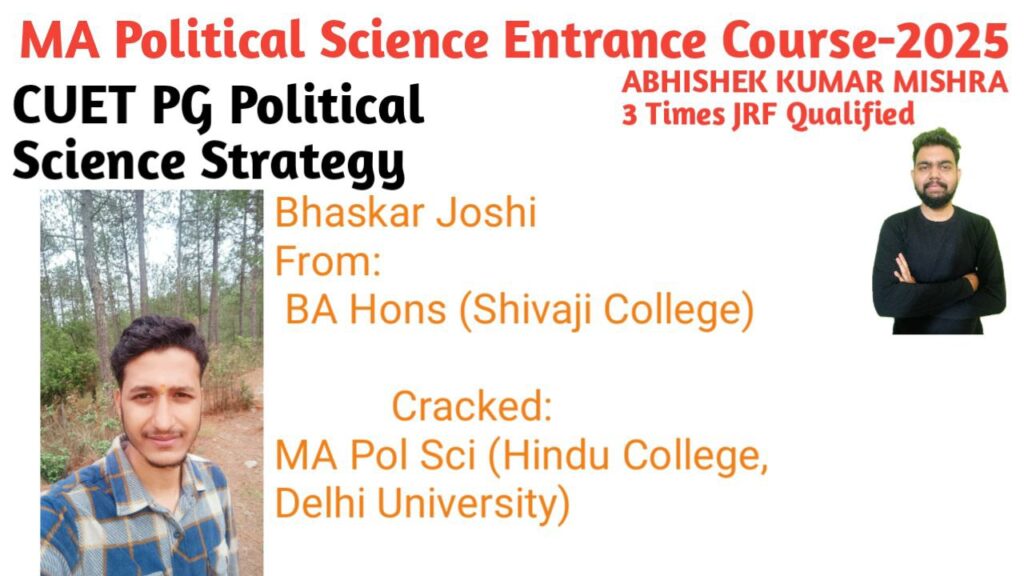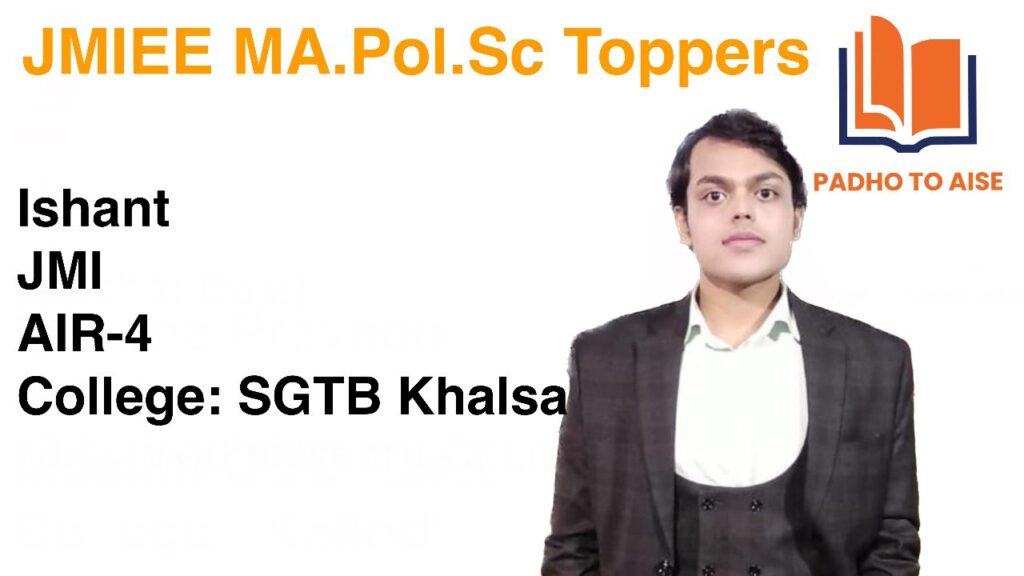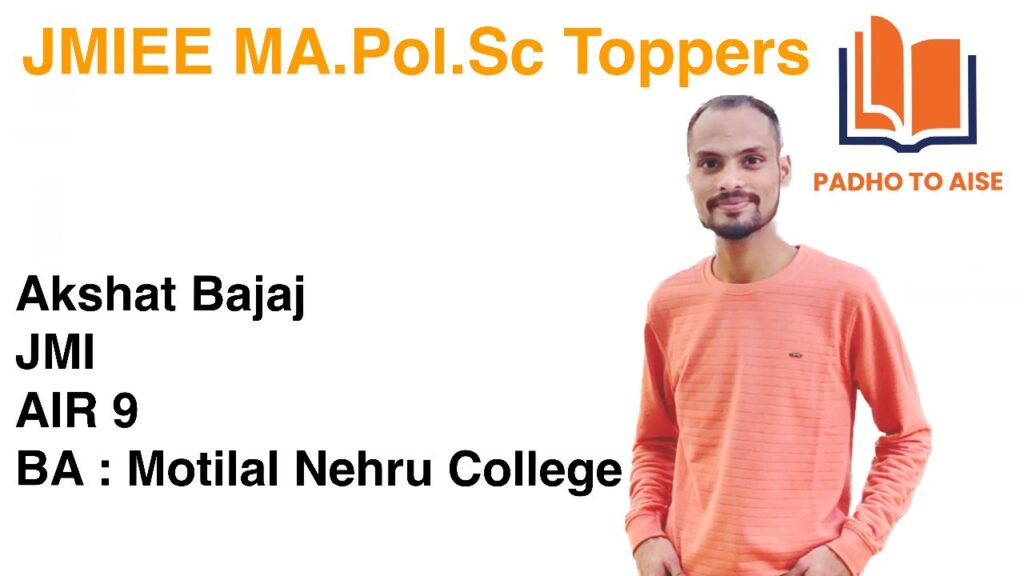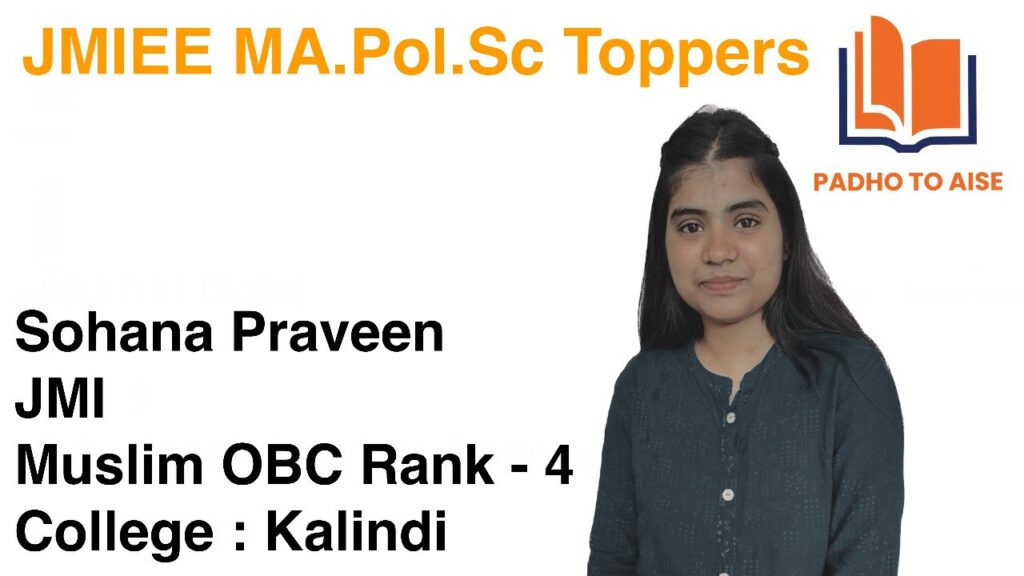CUET UG Political Science Course 2025
By: Nazmine Mallick
UGC NET Qualified.
UG From: PG DAV College, Delhi University.
PG From: Jamia Milia Islamia University, Delhi
After a huge Success in CUET PG & UGC NET; We are now here to help you in CUET UG.
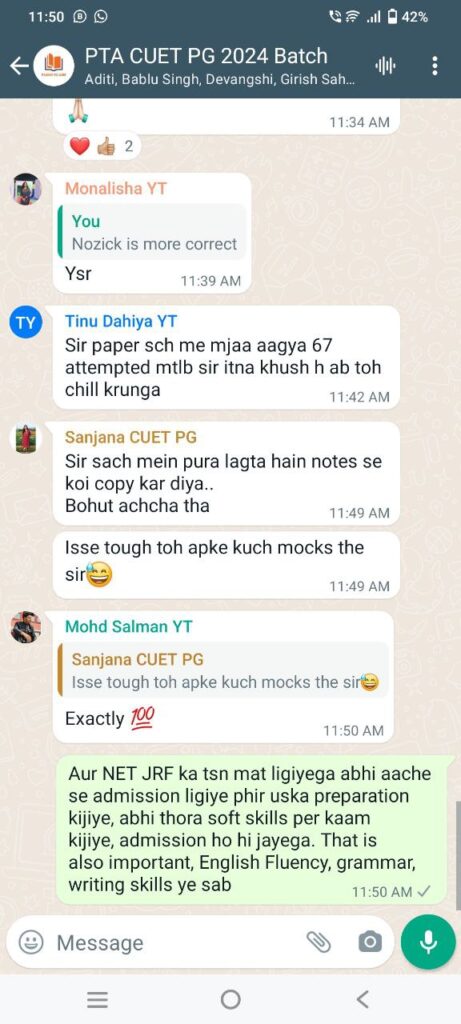
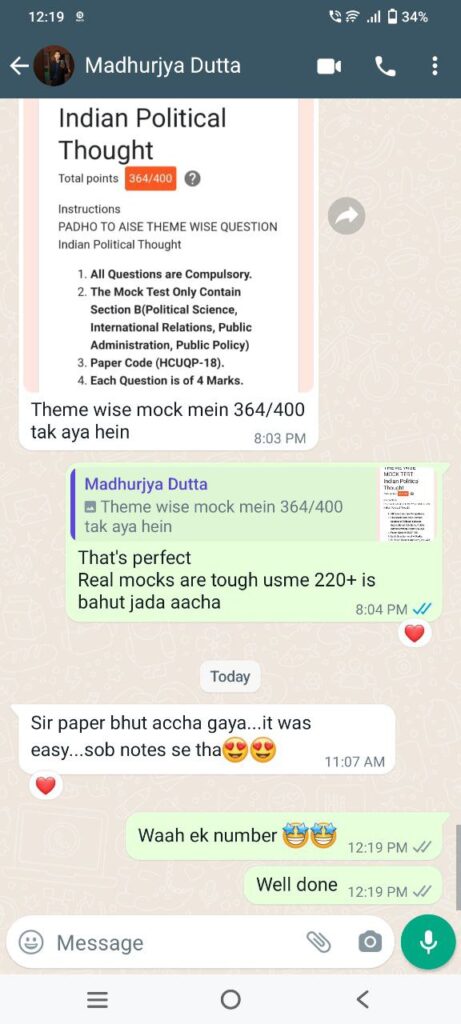
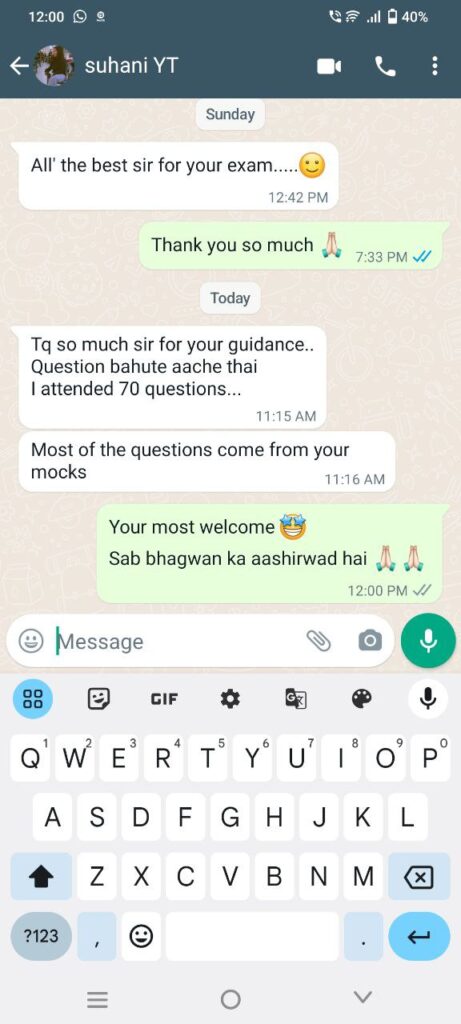
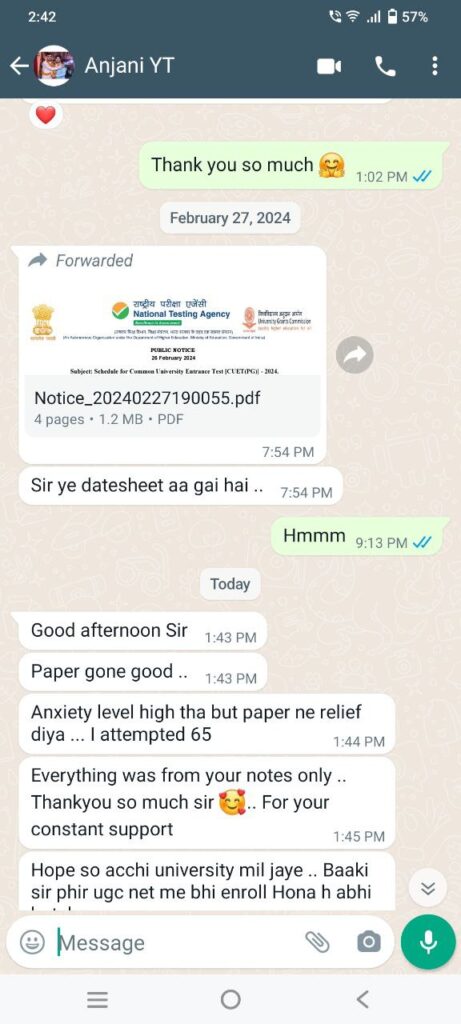
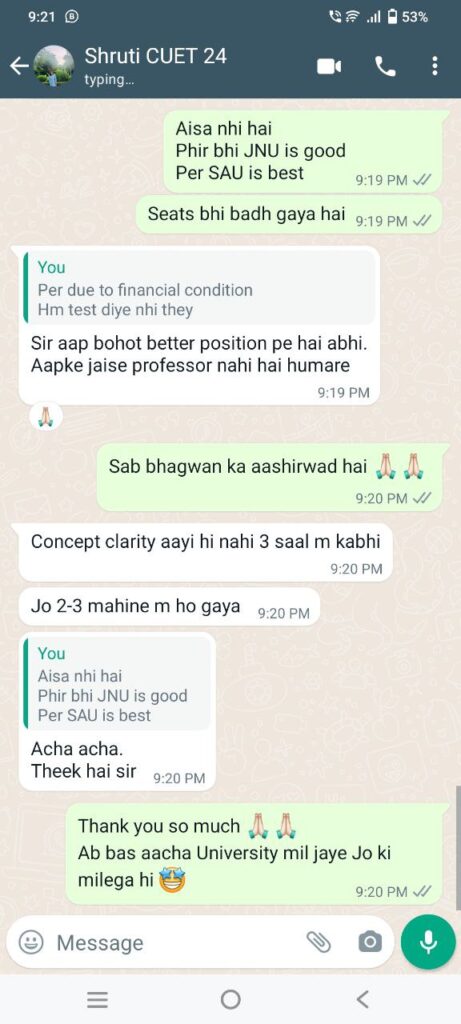
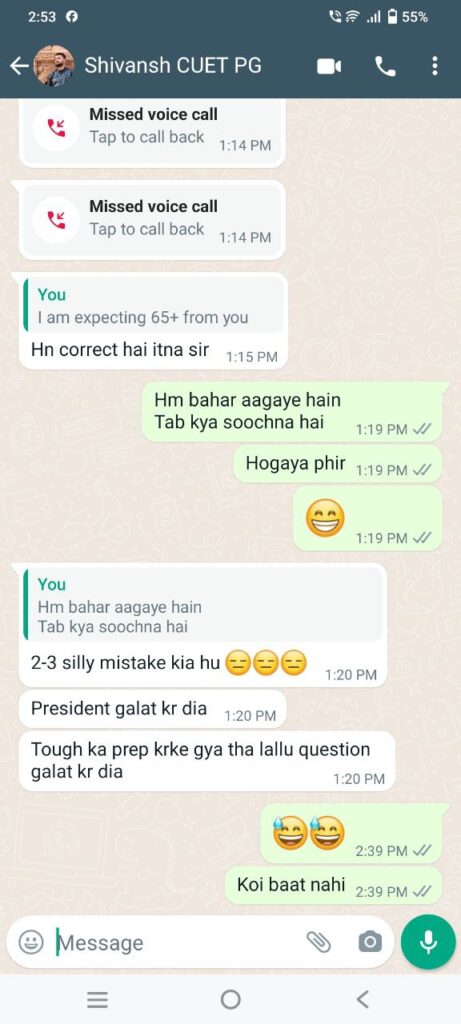
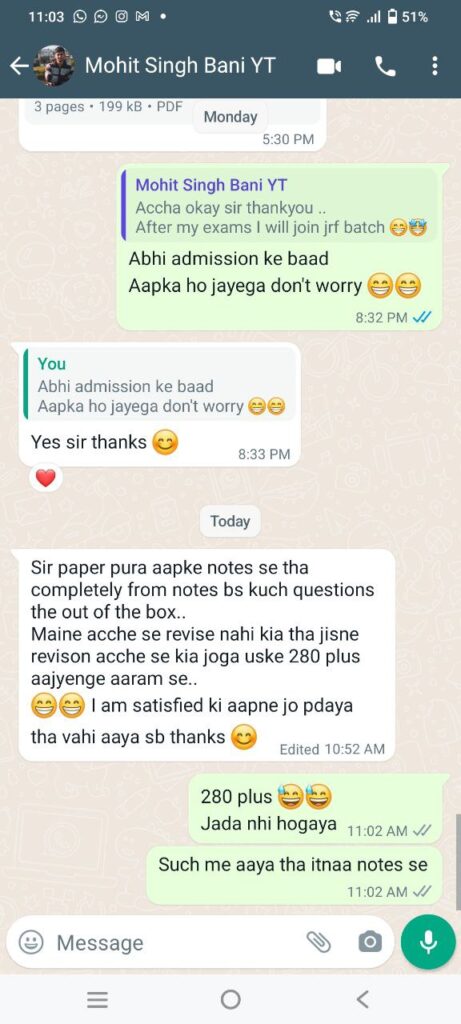
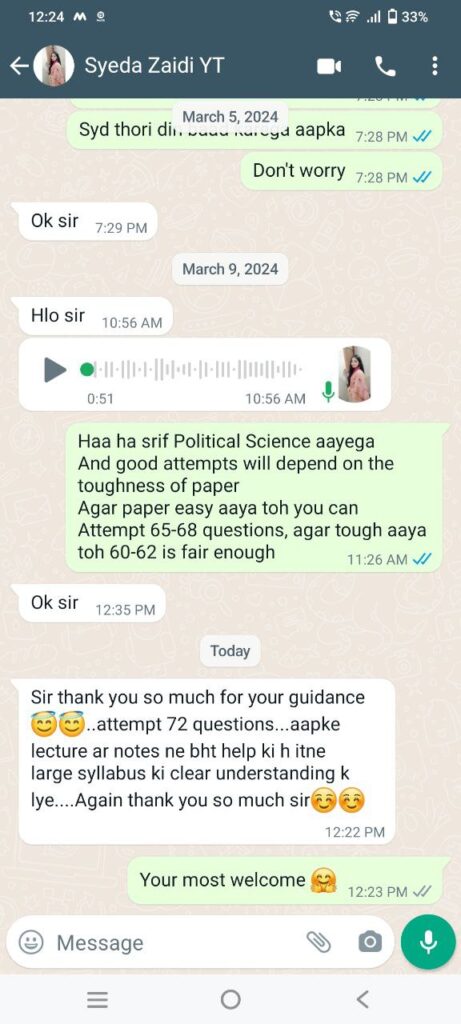
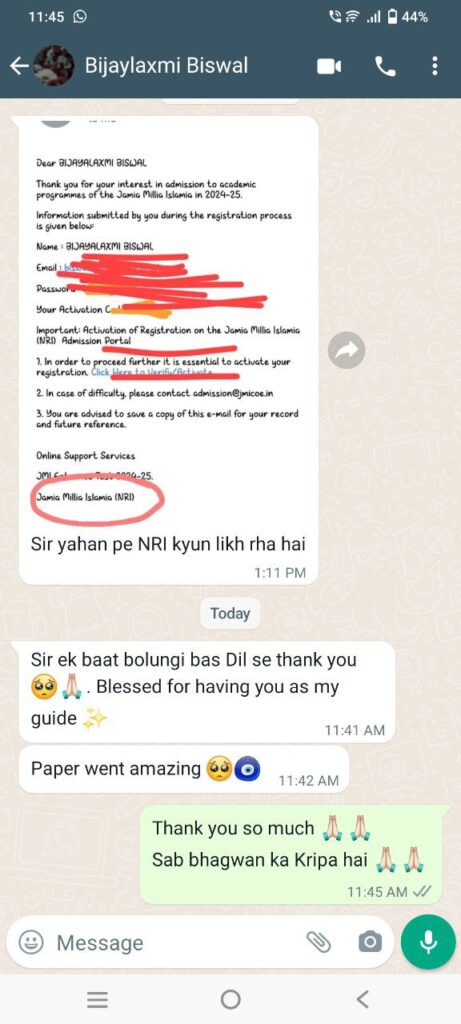

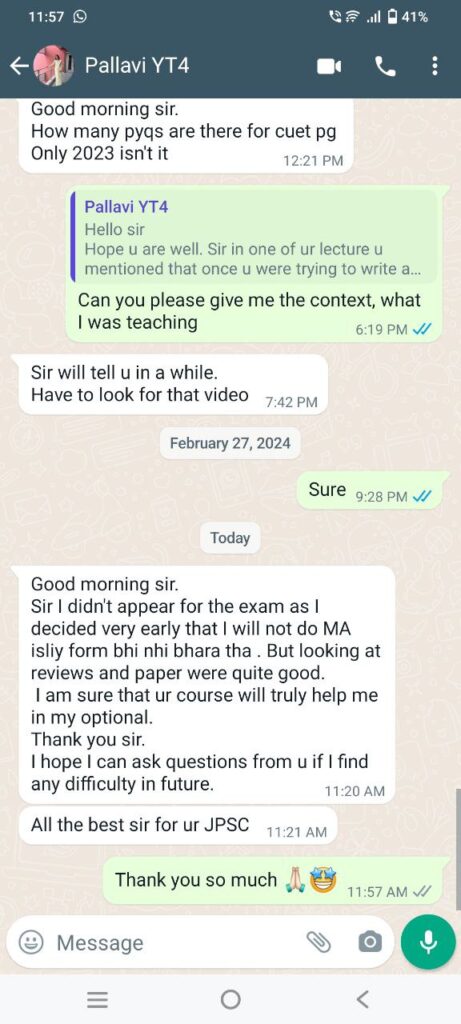

-
3000+ Questions for Practice in all
We are providing you with 3000+ Questions for Practice. There will be 15 Practice Questions from each Lecture. In all there will be total of 3000 Questions.
-
Live & Recorded Video Lectures
We provide you with Live & Recorded video lectures on every topic of Political Science required for the CUET UG Exam in detail.
-
Live Question Practice
We are providing you with live question practice for every concept. We discuss 15 Questions in detail in each class. We also provide you the recording for the same, you can watch this later if you miss the live class.
-
Daily Quiz
We also provide daily quizzes to make commands on concepts after every class. The pattern of questions is similar to CUET UG.
-
Sectional/ Theme-Wise Mock Test
We are also providing Theme-Wise Mock Test to make to better by more practice. We are offering more than 10 Theme-Wise Mocks.
-
Test Series
We will also provide 10 full mocks for better results based on the latest pattern of CUET UG.
-
PDF Notes
We also provide PDF Notes after every class on the Portal, However making your own notes using those PDFs are more fruitful for the result.
The Common University Entrance Test (CUET) is being introduced for admission into Undergraduate (UG) programmes in Central and Participating Universities for the Academic Session 2025-26 under the Ministry of Education (MoE). The CUET will provide a common platform and equal opportunities to candidates across the country, particularly benefiting those from rural and remote areas. It aims to establish a stronger connection between students and universities. With a single application form, candidates will be able to apply to multiple Central and participating Universities, enhancing their outreach and making the admission process more accessible and streamlined.
The National Testing Agency (NTA) has been assigned the responsibility of conducting the CUET 2025 for admission to Undergraduate (UG) programmes across participating universities. This national-level entrance test is designed to ensure a fair and efficient admission process for students across India.
Colleges Under the University of Delhi Offering B.A. Political Science:
- Hindu College
- Lady Shri Ram College for Women (LSR)
- Miranda House
- St. Stephen’s College
- Ramjas College
- Sri Venkateswara College
- Kirori Mal College
- Indraprastha College for Women
- Zakir Husain Delhi College
- Shaheed Bhagat Singh College
- Maitreyi College
- Kamala Nehru College
- Daulat Ram College
- Sri Guru Tegh Bahadur Khalsa College
- Sri Aurobindo College
- Dyal Singh College
- Gargi College
- Shyama Prasad Mukherji College for Women
- Atma Ram Sanatan Dharma College (ARSD)
- Vivekananda College
- Satyawati College
- Bharti College
- Motilal Nehru College
- Rajdhani College
- Kalindi College
- Shivaji College
- P.G.D.A.V. College
- Jesus and Mary College (JMC)
- Swami Shraddhanand College
- Maharaja Agrasen College
- Shyam Lal College
Other Universities & Colleges offering BA Political Science by CUET UG.
- Banaras Hindu University (BHU), Varanasi
- Aligarh Muslim University (AMU), Aligarh
- Jamia Millia Islamia (JMI), New Delhi
- Babasaheb Bhimrao Ambedkar University (BBAU), Lucknow
- Central University of Rajasthan (CURAJ), Ajmer
- Central University of Kerala (CUK), Kasaragod
- Central University of Haryana (CUH), Mahendragarh
- Central University of South Bihar (CUSB), Gaya
- Central University of Gujarat (CUG), Gandhinagar
- Central University of Jharkhand (CUJ), Ranchi
- Central University of Punjab (CUPB), Bathinda
- Central University of Odisha (CUO), Koraput
- Central University of Tamil Nadu (CUTN), Thiruvarur
- Guru Ghasidas Vishwavidyalaya (GGU), Bilaspur
- Mahatma Gandhi Central University (MGCU), Motihari
- Manipur University, Imphal
- North-Eastern Hill University (NEHU), Shillong
- Tezpur University, Tezpur
- Pondicherry University, Puducherry
- Hemvati Nandan Bahuguna Garhwal University (HNBGU), Srinagar, Uttarakhand
- Dr. Harisingh Gour University, Sagar
- Central University of Kashmir, Srinagar
- Central University of Himachal Pradesh (CUHP), Dharamshala
FAQs CUET UG-2025
Frequently Asked Questions (FAQs) for CUET (UG) – 2025
Related to the Syllabus of CUET (UG) – 2025
Where can I access the syllabus for CUET (UG) – 2025?
The syllabus for CUET (UG) – 2025 is available on the official website: https://exams.nta.ac.in/CUET-UG/. Candidates are advised to refer to the authentic sources for any updates.Is there any change in the syllabus for CUET (UG) – 2025 compared to last year?
No, the CUET (UG) 2025 syllabus remains unchanged from the previous year.What is the syllabus for CUET (UG) – 2025?
CUET (UG) – 2025 offers 63 subjects/languages, including 33 languages, 29 subjects, and 1 General Test. The Language Test will assess comprehension, literary aptitude, and vocabulary, while the General Test will cover general knowledge, current affairs, logical reasoning, and numerical ability.How was the syllabus for CUET (UG) – 2025 prepared?
The syllabus was created after consulting various educational stakeholders and aligns with national educational standards, ensuring consistency and coverage of essential topics.What if my syllabus differs from the topics mentioned for CUET (UG) – 2025?
The syllabus is designed to cover content from various educational boards across India. In case your board has reduced chapters, CUET (UG) provides an overall choice of 10 questions in all subjects to accommodate such differences.
Section I: Changes in CUET (UG) – 2025
How many subjects can I choose for CUET (UG) – 2025?
Candidates can choose up to 6 subjects, including languages and the General Test. It is advisable to select at least one language.How many questions need to be answered per subject?
Candidates must answer 40 out of 50 questions for subjects and languages, and 50 out of 60 for the General Test.
Section II: Overview of CUET (UG) – 2025
What is CUET (UG) – 2025?
CUET (UG) – 2025 is a Common University Entrance Test for admission to undergraduate programs at Central Universities and other participating institutions. It provides equal opportunities for students nationwide, offering a standardized platform for admission to various institutions.How will CUET (UG) – 2025 help students?
CUET (UG) reduces the pressure on students to score exceptionally high marks in Class 12 board exams. The test offers a fair platform for students from different educational backgrounds and ensures that they are assessed objectively through multiple-choice questions.What is the structure of the CUET (UG) – 2025 examination?
The test includes 33 languages, 29 domain subjects, and 1 General Test. Candidates can select up to 6 subjects, including both language and domain-specific subjects.
Section III: Application and Exam Information for CUET (UG) – 2025
Where can I apply for CUET (UG) – 2025?
You can apply online through the official website https://exams.nta.ac.in/CUET-UG/. Please ensure that you check the university requirements before selecting subjects.Can I apply for multiple universities through one application?
Yes, a single application allows you to apply to multiple universities participating in CUET (UG) – 2025.How will I pay the application fee for CUET (UG) – 2025?
You can pay the application fee through Debit/Credit cards, Net Banking, UPI, or Wallet services.
CUET UG Political Science (323): Syllabus
The Common University Entrance Test (CUET) UG Political Science exam is a national-level test conducted for undergraduate admissions into Political Science programs offered by Central and participating universities across India. This exam provides a common platform for students aspiring to pursue higher education in political science, ensuring a standardized evaluation process. Political Science as a subject explores the intricacies of political systems, governance, national and international political developments, and the changing dynamics of global affairs.
The CUET UG Political Science syllabus for 2025 is designed to align with the Class 12 curriculum, ensuring that students are evaluated based on the knowledge and understanding they have gained during their school education. The syllabus is divided into two sections: Politics in India Since Independence and Contemporary World Politics. Together, these sections cover the key political events, movements, ideologies, and changes that have shaped India and the world.
Exam Format:
- Paper Code: 323
- There will be 50 questions, and candidates are required to attempt 40 questions.
Political Science – 323
Politics in India Since Independence
The Era of One-Party Dominance
- First three general elections, nature of Congress dominance at the national level, uneven dominance at the state level, coalitional nature of Congress, and major opposition parties.
Nation-Building and Its Problems
- Nehru’s approach to nation-building, legacy of partition, the challenge of refugee resettlement, the Kashmir problem, and political conflicts over language.
Politics of Planned Development
- Five-year plans, expansion of the state sector, the rise of new economic interests, famine, suspension of five-year plans, and the Green Revolution.
India’s External Relations
- Nehru’s foreign policy, Sino-Indian war (1962), Indo-Pak wars (1965 and 1971), India’s nuclear program, and alliances in world politics.
Challenge to and Restoration of Congress System
- Political succession after Nehru, non-Congressism, electoral upsets of 1967, Congress split, reconstitution, and 1971 elections.
Crisis of the Constitutional Order
- Search for committed bureaucracy and judiciary, Gujarat and Bihar movements, Emergency (context, constitutional and extra-constitutional dimensions), and the rise of civil liberties organizations.
Regional Aspirations and Conflicts
- Rise of regional parties, Punjab crisis, anti-Sikh riots (1984), Kashmir situation, and challenges in the Northeast.
Rise of New Social Movements
- Farmers’ movements, women’s movements, environmental and development-affected people’s movements, Mandal Commission report, and its aftermath.
Democratic Upsurge and Coalition Politics
- Rise of JD and BJP, regional parties, coalition politics, UF and NDA governments, and elections of 2004 and UPA government.
Recent Issues and Challenges
- Globalization, OBC politics in North India, Dalit politics, communalism, Ayodhya dispute, and Gujarat riots.
Contemporary World Politics
Cold War Era in World Politics
- Emergence of two power blocs post-World War II, arenas of the Cold War, Non-Aligned Movement, and India’s role.
Disintegration of the ‘Second World’ and Collapse of Bipolarity
- Formation of new entities (Russia, Balkan states, Central Asian states), democratic politics, capitalism in post-communist regimes, and India’s relations with Russia and other post-communist countries.
US Dominance in World Politics
- Growth of unilateralism (Afghanistan, Gulf War, 9/11, Iraq), challenges to US dominance, and India’s renegotiated relations with the USA.
Alternative Centres of Economic and Political Power
- Rise of China, European Union expansion, ASEAN growth, and India-China relations.
South Asia in the Post-Cold War Era
- Democratization in Pakistan and Nepal, ethnic conflict in Sri Lanka, impact of globalization, and India’s relations with neighbors.
International Organizations in a Unipolar World
- Restructuring of the UN, India’s position, rise of new international actors, NGOs, and global governance accountability.
Security in Contemporary World
- Traditional security concerns, disarmament, human security issues (poverty, health, education), human rights, and migration.
Environment and Natural Resources in Global Politics
- Global environmental norms, conflicts over resources, rights of Indigenous people, and India’s role in global environmental debates.
Globalization and Its Critics
- Economic, cultural, political manifestations, debates on globalization, anti-globalization movements, and India’s role.

Universities Offering B.A Political Science through CUET UG.
Colleges Under the University of Delhi Offering B.A. Political Science:
- Hindu College
- Lady Shri Ram College for Women (LSR)
- Miranda House
- St. Stephen’s College
- Ramjas College
- Sri Venkateswara College
- Kirori Mal College
- Indraprastha College for Women
- Zakir Husain Delhi College
- Shaheed Bhagat Singh College
- Maitreyi College
- Kamala Nehru College
- Daulat Ram College
- Sri Guru Tegh Bahadur Khalsa College
- Sri Aurobindo College
- Dyal Singh College
- Gargi College
- Shyama Prasad Mukherji College for Women
- Atma Ram Sanatan Dharma College (ARSD)
- Vivekananda College
- Satyawati College
- Bharti College
- Motilal Nehru College
- Rajdhani College
- Kalindi College
- Shivaji College
- P.G.D.A.V. College
- Jesus and Mary College (JMC)
- Swami Shraddhanand College
- Maharaja Agrasen College
- Shyam Lal College
Other Universities & Colleges offering BA Political Science by CUET UG.
- Banaras Hindu University (BHU), Varanasi
- Aligarh Muslim University (AMU), Aligarh
- Jamia Millia Islamia (JMI), New Delhi
- Babasaheb Bhimrao Ambedkar University (BBAU), Lucknow
- Central University of Rajasthan (CURAJ), Ajmer
- Central University of Kerala (CUK), Kasaragod
- Central University of Haryana (CUH), Mahendragarh
- Central University of South Bihar (CUSB), Gaya
- Central University of Gujarat (CUG), Gandhinagar
- Central University of Jharkhand (CUJ), Ranchi
- Central University of Punjab (CUPB), Bathinda
- Central University of Odisha (CUO), Koraput
- Central University of Tamil Nadu (CUTN), Thiruvarur
- Guru Ghasidas Vishwavidyalaya (GGU), Bilaspur
- Mahatma Gandhi Central University (MGCU), Motihari
- Manipur University, Imphal
- North-Eastern Hill University (NEHU), Shillong
- Tezpur University, Tezpur
- Pondicherry University, Puducherry
- Hemvati Nandan Bahuguna Garhwal University (HNBGU), Srinagar, Uttarakhand
- Dr. Harisingh Gour University, Sagar
- Central University of Kashmir, Srinagar
- Central University of Himachal Pradesh (CUHP), Dharamshala
Central Universities:
- Central Tribal University of Andhra Pradesh
- Central University of Andhra Pradesh
- Central University of Himachal Pradesh
- Central University of Jammu
- Central University of Karnataka
- Central University of Kerala
- Central University of Odisha
- Central University of Punjab
- Central University of Rajasthan
- Central University of South Bihar
- Central University of Tamil Nadu
- Guru Ghasidas Vishwavidyalaya
- Dr. Harisingh Gour Vishwavidyalaya, Sagar
- Mahatma Gandhi Central University
- North-Eastern Hill University
- Tezpur University
- University of Allahabad
- University of Hyderabad
- Visva-Bharati University
State Universities:
- Baba Ghulam Shah Badshah University
- Barkatullah University
- Cluster University of Jammu
- Cluster University of Srinagar
- Cotton University
- Devi Ahilya Vishwavidyalaya
- Dibrugarh University
- Guru Gobind Singh Indraprastha University
- M.P. Bhoj (Open) University
- Rani Durgavati University
Deemed Universities:
- Jamia Hamdard
- Jain (Deemed-to-be University), Bangalore
- Dayalbagh Educational Institute
- Datta Meghe Institute of Higher Education and Research
- Lingaya’s Vidyapeeth
- Shiv Nadar Institution of Eminence
